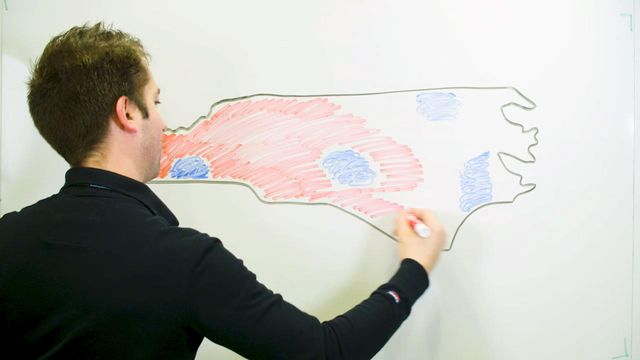The New Yorker says it has files late GOP mapmaker used to draw gerrymandered districts
Tom Hofeller's files, at issue during a recent gerrymandering case, provide more detail on his North Carolina work.
Posted — UpdatedFew of the files have been seen publicly, though, and although The New Yorker said Friday that it has them, it did not make them available online.
But it described some of them, laying out the mapmaker's back and forth with unnamed officials in several states, including North Carolina, and breaking down files his estranged daughter turned over to attorneys who succeeded in overturning Hofeller's legislative maps in North Carolina.
Among other things, the magazine said Hofeller, "created giant databases that detailed the racial makeup, voting patterns and residence halls of more than a thousand North Carolina A&T students," as well as other North Carolina college students.
N.C. A&T State University is a historically back institution in Greensboro.
Some spreadsheets "have more than fifty different fields with precise racial, gender and geographic details," the magazine said, and one identified nearly 5,500 college students who appeared to lack the necessary ID to vote.
The story suggests that some or all of this may have played into the GOP's decision to split N.C. A&T's campus between a pair of heavily Republican congressional districts, diluting the voting power of black students living in university residence halls.
"Hofeller knew which A&T students lived in Aggie Village, on the north side of campus, and which resided in Morrow or Vanstory Halls, on the south side – along with a detailed racial breakdown and information about their voting status," Daley reported. "As Hofeller sought to create two reliably Republican congressional districts, his computer contained information on the precise voting tendencies of one of the largest concentrations of black voters in the area."
The New Yorker also said Hofeller's hard drive held a map of North Carolina's 2017 judicial districts, "with an overlay of the black voting-age population by district, suggesting that these maps – which are currently at the center of a protracted legal battle – might also be a racial gerrymander."
A spokesman for Senate President Pro Tem Phil Berger called the files "a sideshow" Friday afternoon.
"Democrats like creating these grand conspiracy theories to distract from their power grab," Berger spokesman Pat Ryan said in an email, accusing Democrats, as other Republicans have, of using repeated lawsuits to accomplish something they haven't been able to do at the ballot box.
Ryan also pointed out that a Democratic mapmaker acknowledged during a recent trial that he used racial and partisan data to draw maps that never had a serious chance at passage in the Republican-controlled General Assembly. He said this "entire charade is a stalking horse for Eric Holder and the Democratic Party to steal legislative majorities while pretending they only care about ‘fair maps.'"
"The least they could do is spare us the righteous indignation and call their ploy what it is: a naked power grab," Ryan said.
Holder, a U.S. attorney general under former President Barack Obama, now heads up a Democratic effort to overturn election maps and help Democrats win state legislative seats ahead of the next census. After that census comes a nationwide redraw of voting maps, which either party could use to help lock-in electoral power for up to a decade.
Democrats in North Carolina have promised to enact nonpartisan redistricting reforms if they win. Republican leadership has resisted that sort of change but could change its tune following this week's loss in court.
Some of Hofeller's files may eventually be released publicly by the courts in North Carolina, which are weighing which should be public documents and which can be protected as a privileged work product. Briefs on that issue were initially due Friday, but the deadline was extended after the court's redistricting order came down earlier this week.
Related Topics
• Credits
Copyright 2024 by Capitol Broadcasting Company. All rights reserved. This material may not be published, broadcast, rewritten or redistributed.





